Resources
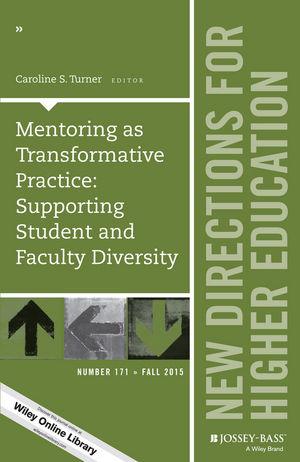
Click Here for Book Review Abstract: Scholars examining how women and people of color advance in academia invariably cite mentorship as one of the most important factors in facilitating student and faculty success. Contributors to this volume underscore the importance of supporting one another, within and across differences, as critical to the development of a diverse professoriate. This volume emphasizes and highlights: - the importance of mentorship; - policies, processes, and practices that result in successful mentoring relationships; - real life mentoring experiences to inform students, beginning faculty, and those who would be mentors; - evidence for policy makers about what works in the development of supportive and nurturing higher education learning environments. The guiding principles underlying successful mentorships, interpersonally and programmatically, presented here can have the potential to transform higher education to better serve the needs of all its members. This is the 171st volume of the Jossey-Bass quarterly report series New Directions for Higher Education. Addressed to presidents, vice presidents, deans, and other higher education decision makers on all kinds of campuses, it provides timely information and authoritative advice about major issues and administrative problems confronting every institution. (From the Publisher)
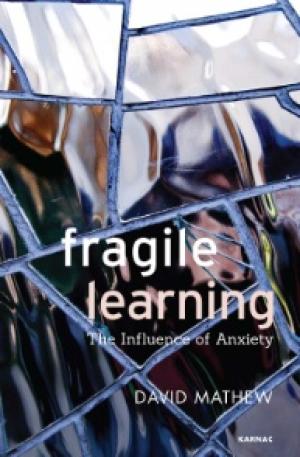
Click Here for Book Review Abstract: What are the barriers and obstacles to adults learning? What makes the process of adult learning so fragile? And what exactly do we mean by fragile learning? This book addresses these questions in two ways. In Part One, it looks at challenges to learning, examining issues such as language invention in a maximum security prison, geography and bad technology, and pedagogic fragility in Higher Education. Through a psychoanalytic lens, Fragile Learning examines authorial illness and the process of slow recovery as a tool for reflective learning, and explores ethical issues in problem-based learning. The second part of the book deals specifically with the problem of online anxiety. From cyberbullying to Internet boredom, the book asks what the implications for educational design in our contemporary world might be. It compares education programs that insist on the Internet and those that completely ban it, while exploring conflict, virtual weapons and the role of the online personal tutor. The book also examines the issue of time as a barrier to learning and its links to unconscious thinking, as well as defining fragility in a summative essay. Using real-life examples, originality and wit, Fragile Learning is an important contribution to the field of psychoanalysis and pedagogy. (From the Publisher)
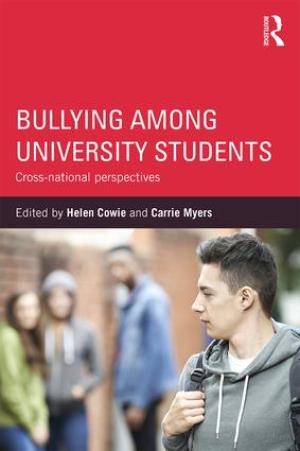
Click Here for Book Review Abstract: Bullying Amongst University Students is a pioneering collection of knowledge and evidence exploring the under-researched phenomenon of bullying in universities. Abusive behaviour amongst young people is a serious and pervasive problem that is exacerbated by the rapid advances in electronic communication, and in this book the authors highlight the problem and proceed to facilitate new practices and policies to address it. This book brings together an international team of authors from a range of disciplines, encompassing education, psychology, criminology, law and counselling, who have carried out research in the area of university bullying. Addressing critical dialogues and debates, the authors explore peer on peer violence, intimidation and social exclusion before considering its effects on students and making recommendations for action and further research. Key topics include: • Cyberbullying and cyber aggression • Rape culture across the university • Homophobic and transphobic bullying • The impact of bullying on mental health • The role of bully and victim across the lifespan • Policies and procedures to address bullying International in authorship and scope, this book will be an invaluable resource for students and researchers in fields such as education, psychology, sociology, health studies and criminology. It is also essential reading for university policy-makers and union representatives responsible for the emotional and physical well-being of students. (From the Publisher)
Tips for enhancing the advising relationship by encouraging student responsibility and participation – without “intruding” or being overbearing.
This essay describes a transformation in my experience as an adjunct teaching underprepared students from one of shame toward a desire to assert the value of this work. Insights from my feminist theological training helped me to affirm the importance of encouraging transformative learning in teaching the academically marginalized and prompted my analysis of student writing in an introductory World Religions course, in order to determine whether or not the course was a site of transformative learning. I argue that despite many contextual limitations, the movement toward deepening self-awareness and increasing openness to religious diversity seen in student writing demonstrates that transformative learning began in this course, and that is valuable for students' lives whether or not they are academically successful.
The article is a response to this journal's call for papers on metaphors for teaching, and also draws from a previous publication in which Kent Eilers developed a methodology for teaching global theologies. In this methodology, the ultimate goal was the development of “hermeneutical dispositions of empathy, hospitality, and receptivity toward culturally diverse voices” (2014, 165). This article considers the goals of Eilers' methodology, and others like his, and how it is that the metaphors of “leaving home” and “communal imagination” highlight the importance of the ambient and interpersonal features of a classroom and their effect on the attainment of the above goals. In so doing, it extends the conversation beyond content and methodology in teaching theology and religion into the realms of philosophy of education, as well as the fields of moral and values education. It is contended that the metaphors informed by these areas of study facilitate the attainment of such goals, and similar ones, by demonstrating that the cultivation of an ambience of care, trust, and compassion within the classroom constitutes an essential foundation for learning in which students “leave home” and cultivate “communal imagination.” The article finishes with practical suggestions for educators in theology and religion.
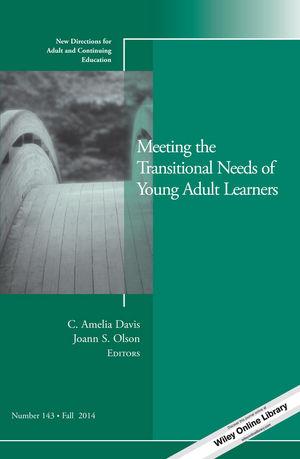
Click Here for Book Review Abstract: This is the first New Directions volume related to young adult learners since 1984. Then, as now, young adults are an important segment of the adult population but have received scant attention in the adult education literature. Increasingly, youths and young adults are enrolling in adult education programs and in doing so are changing the meaning of adulthood. Given the significant demographic, technological, and cultural shifts during the past 30 years, there is an increasing need for practitioners and program planners to reconsider what constitutes “adult” and “adult education.” An understanding of the changing meaning of adulthood is fundamental to developing programs and policies that will address the needs of younger learners, and we believe it is time for an updated discussion among adult educators and scholars in other disciplines. This sourcebook is designed to reignite the discussion related to meeting the educational needs of young adults along with a timely and interdisciplinary discussion that highlights the transitional needs of young adult learners. This is the 143rd volume of the Jossey Bass series New Directions for Adult and Continuing Education. Noted for its depth of coverage, it explores issues of common interest to instructors, administrators, counselors, and policymakers in a broad range of education settings, such as colleges and universities, extension programs, businesses, libraries, and museums. (From the Publisher)
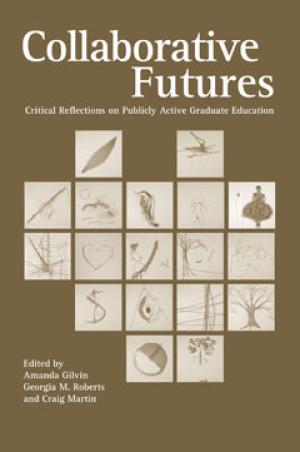
Collaborative Futures places graduate education at the center of ongoing efforts to legitimize publicly engaged scholarship within the academic profession. It is indispensable reading not only for graduate students seeking inspiration, resources, and usable frameworks for their engaged scholarship, but for the faculty who are called upon to mentor them and for university administrators seeking encouraging answers to questions about the future of graduate education. Given the erosion of the tenure system and the casualization of teaching labor, graduate programs and professional organizations in many fields now recognize the imperative to prepare doctoral students for careers wholly or partially outside academe. This book powerfully indicates both the need and the means to change institutional cultures and forge a publicly active path for graduate education. (From the Publisher)

Click Here for Book Review Abstract: A timeless book of lessons on mentorship, teaching, and learning from New York Times bestselling author Tim Gunn, host of the Emmy Award–nominated Project Runway and the reality show Under the Gunn. Tim Gunn, America’s favorite reality TV cohost, is known for his kind but firm approach in providing wisdom, guidance, and support to the scores of design hopefuls on Project Runway. Having begun his fashion career as a teacher at Parsons The New School for Design, Tim knows more than a thing or two about mentorship and how to convey invaluable pearls of wisdom in an approachable, accessible manner. While Gunn’s Golden Rules showcased Tim “as life coach,” imparting lessons based on his personal experiences, Tim Gunn: The Natty Professor will focus on Tim “as teacher.” Divided into sections on common themes—leadership, curiosity, diversity, understanding, empathy—this practical, timely book takes us on a journey through life lessons and uses Tim’s own personal experiences, from the classroom to the therapist’s office, to illustrate larger concepts. Each chapter will end with a “life assignment,” where Tim challenges you to apply the lessons you’ve learned in practical mentoring or teaching situations. (From the Publisher)
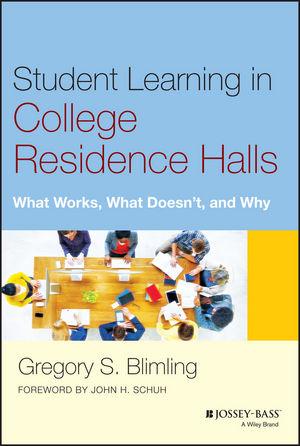
Click Here for Book Review Abstract: Grounded in current research and practical experience, Student Learning in College Residence Halls: What Works, What Doesn't, and Why shows how to structure the peer environment in residence halls to advance student learning. Focusing on the application of student learning principles, the book examines how neurobiological and psychosocial development influences how students learn in residence halls. The book is filled with examples, useful strategies, practical advice, and best practices for building community and shaping residential environments that produce measureable learning outcomes. Readers will find models for a curriculum-based approach to programming and for developing student staff competencies, as well as an analysis of what types of residential experiences influence student learning. An examination of how to assess student learning in residence halls and of the challenges residence halls face provide readers with insight into how to strategically plan for the future of residence halls as learning centers. The lack of recent literature on student learning in college residence halls belies the changes that have taken place. More traditional-age students are enrolled in college than ever before, and universities are building more residence halls to meet the increased demand for student housing. This book addresses these developments, reviews contemporary research, and provides up-to-date advice for creating residence hall environments that achieve educationally purposeful outcomes. • Discover which educational benefits are associated with living in residence halls • Learn how residential environments influence student behavior • Create residence hall environments that produce measureable learning outcomes • Monitor effectiveness with a process of systematic assessment Residence halls are an integral part of the college experience; with the right programs in place they can become dynamic centers of student learning. Student Learning in College Residence Halls is a comprehensive resource for residence hall professionals and others interested in improving students' learning experience. (From the Publisher)